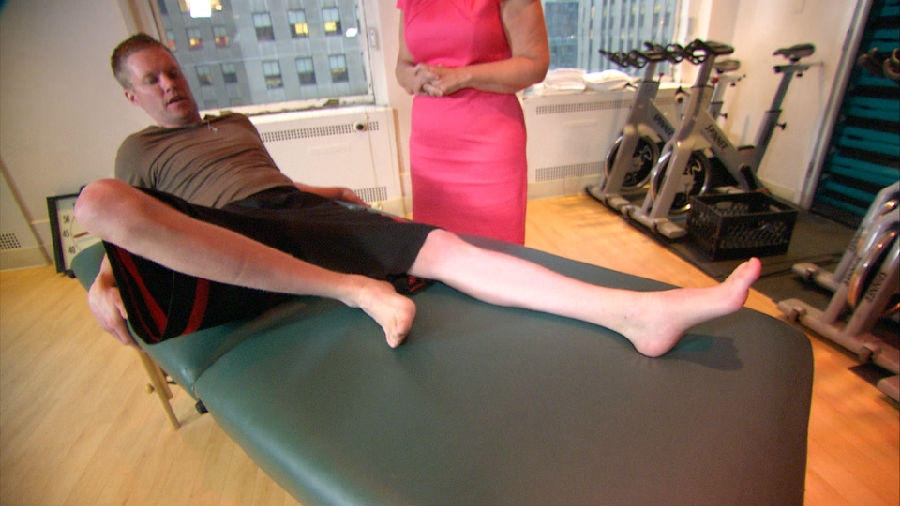"I can't move my legs," the 26-year-old man told his younger brother, who towered above him as he lay sprawled on the floor. He'd been on his computer for hours, he explained, and when he tried to stand up, he couldn't. His legs looked normal, felt normal, yet they wouldn't move.
一名26歲男子對他弟弟說,“我的腿動不了了。”這名男子四肢他弟弟,他四肢平伸地躺在地上,他弟弟俯身看著他。他解釋說,數(shù)個小時以來他一直在用電腦,而當他試圖站起來時,卻發(fā)現(xiàn)自已站不起來了。他的腿看起來很正常,感覺也是正常的,但卻無法動彈。
At first, he figured his legs must have fallen asleep. He pulled himself up, leaning on his desk, and slowly straightened until he was standing. He could feel the weight on his feet and knees. He let go of the desk and commanded his legs to move. Instead, they buckled, and he landed on the floor with a thud.
一開始,他想他的腿一定是麻了。他費力地起身,靠在桌子上,然后慢慢地站直身體。他能感覺到腳和膝蓋上的重量。之后,他放開桌子,讓自已的腿動起來。但是,他的腿卻無法移動,導(dǎo)致他砰的一聲倒在地上。
His brother awkwardly pulled him onto the bed. Then they waited. Surely this weird paralysis would disappear just as suddenly as it came. An hour passed, then two. I'm calling an ambulance, the younger brother announced finally. Reluctantly, the elder agreed. He was embarrassed to be this helpless but worried enough to want help.
他弟弟艱難地將他拉到床上。之后他們開始等待。這種奇怪的麻痹肯定會突然消失,就像它突然到來一樣。一個小時過去了,然后兩個小時過去了。他弟弟終于表示,“我要叫救護車。”這名男子很不情愿地同意了。他對自已這種無助的狀態(tài)感到難堪,但他同時也非常擔心,所以他需要幫助。
 When the E.M.T.s arrived, they were as confused as the brothers. The medics asked what the young man had been up to. Nothing bad, he assured them. For the past few weeks he had been getting back into shape. He changed his diet, cut out the junk and was drinking a protein concoction that was supposed to help him build muscle. And he was working out hard every day. He'd lost more than 20 pounds, he added proudly.
When the E.M.T.s arrived, they were as confused as the brothers. The medics asked what the young man had been up to. Nothing bad, he assured them. For the past few weeks he had been getting back into shape. He changed his diet, cut out the junk and was drinking a protein concoction that was supposed to help him build muscle. And he was working out hard every day. He'd lost more than 20 pounds, he added proudly.
緊急醫(yī)療救護技術(shù)員(簡稱EMT)到達了現(xiàn)場,他們和兄弟倆一樣感到困惑。醫(yī)護人員詢問那名年輕人最近做了什么。他向醫(yī)護人員保證,他沒做不好的事情。過去幾周,他一直在努力恢復(fù)身材。他改變了飲食習慣,減少了垃圾食品的攝入,飲用一種旨在幫助其鍛煉肌肉的蛋白質(zhì)混合物。他每天都在努力鍛煉。他還自豪地表示,他瘦了20多磅。
Hearing about this extreme diet and exercise regimen, the E.M.T.s told the man he was probably dehydrated. He needed fluids and some electrolytes. A couple of bottles of Gatorade and he would very likely feel a lot better. And if he didn't, he could call again.
聽到這種極端的飲食和運動計劃后,急救人員告訴這名男子,他可能脫水了。他需要液體和電解質(zhì)。喝幾瓶佳得樂,會讓他感覺好很多。如果情況沒有好轉(zhuǎn),他可以再打急救電話。
With his brother's help, the man moved himself to a sitting position. He drank some water and Gatorade and waited to start feeling better. He fell asleep, still waiting. By the following afternoon he was having trouble sitting upright. He was drinking yet another Gatorade when he noticed that the bottle felt heavy. He realized with a start that the weakness had moved into his arms. Call the ambulance, he told his brother. This can't be dehydration.
這名男子在弟弟的幫助下坐了起來。他喝了些水還有佳得樂,等待情況好轉(zhuǎn)。在等待的過程中,他睡著了。第二天下午時,他很難坐直身體。于是他又喝了一瓶佳得樂,這時他發(fā)現(xiàn)瓶子變得很重。他開始意識到自己的虛弱已經(jīng)轉(zhuǎn)移到手臂。他對他弟弟說,叫救護車。這不可能是脫水。
A new set of E.M.T.s agreed. They hoisted the weakened man onto a stretcher, fastened the straps tightly and headed down the stairs. The man felt himself pitch forward as the stretcher tilted down. Was he going to fall? He imagined himself tumbling down the stairs like a sack of potatoes, completely unable to protect himself. The straps held him on the stretcher, but that feeling of helplessness terrified him.
這次來的緊急醫(yī)療救護技術(shù)員對此表示同意。他們將這名虛弱的男子抬上擔架,扣緊固定帶,之后走下樓梯。當擔架向下傾斜時,那名男子感覺自己在向前傾斜。他會摔倒嗎?他想象自己像一袋土豆一樣從樓梯上摔下來,完全無法保護自己。固定帶將他固定在擔架上,但那種無助的感覺令他感到害怕。
譯文由可可原創(chuàng),僅供學習交流使用,未經(jīng)許可請勿轉(zhuǎn)載。
 When the E.M.T.s arrived, they were as confused as the brothers. The medics asked what the young man had been up to. Nothing bad, he assured them. For the past few weeks he had been getting back into shape. He changed his diet, cut out the junk and was drinking a protein concoction that was supposed to help him build muscle. And he was working out hard every day. He'd lost more than 20 pounds, he added proudly.
When the E.M.T.s arrived, they were as confused as the brothers. The medics asked what the young man had been up to. Nothing bad, he assured them. For the past few weeks he had been getting back into shape. He changed his diet, cut out the junk and was drinking a protein concoction that was supposed to help him build muscle. And he was working out hard every day. He'd lost more than 20 pounds, he added proudly.










